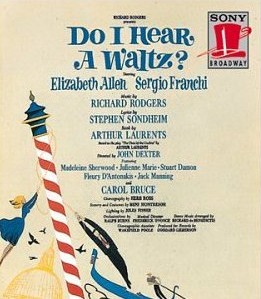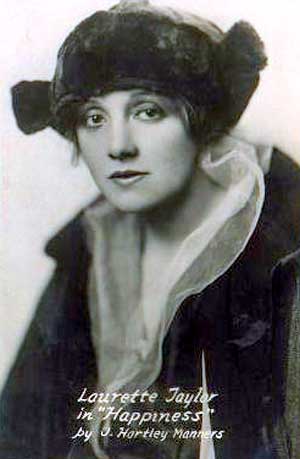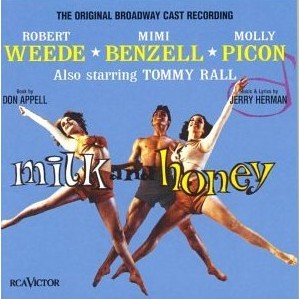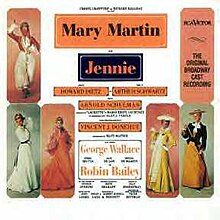
Mary Virginia Martin was an American actress and singer. A muse of Rodgers and Hammerstein, she originated many leading roles on stage over her career, including Nellie Forbush in South Pacific (1949), the title character in Peter Pan (1954), and Maria von Trapp in The Sound of Music (1959). She was named a Kennedy Center Honoree in 1989. She was the mother of actor Larry Hagman.

Ethel Merman was an American actress and singer. Known for her distinctive, powerful voice, and her leading roles in musical theater, she has been called "the undisputed First Lady of the musical comedy stage." She performed on Broadway in Anything Goes, Annie Get Your Gun, Gypsy, and Hello, Dolly!

Do I Hear a Waltz? is a musical with a book by Arthur Laurents, music by Richard Rodgers, and lyrics by Stephen Sondheim. It was adapted from Laurents' 1952 play The Time of the Cuckoo, which was the basis for the 1955 film Summertime starring Katharine Hepburn.

Arthur Schwartz was an American composer and film producer, widely noted for his songwriting collaborations with Howard Dietz.

Howard Dietz was an American publicist, lyricist, and librettist, best remembered for his songwriting collaboration with Arthur Schwartz.

Gay Divorce is a musical with music and lyrics by Cole Porter and book by Dwight Taylor, adapted by Kenneth Webb and Samuel Hoffenstein. It was Fred Astaire's last Broadway show and featured the hit song "Night and Day" in which Astaire danced with co-star Claire Luce.
Hot Spot is a musical with the book by Jack Weinstock and Willie Gilbert, lyrics by Martin Charnin, music by Mary Rodgers, and additional lyrics and music by Stephen Sondheim. It had a brief run on Broadway in 1963. The musical is a political satire.
Matt Mattox was an American jazz and ballet dancer. He was a Broadway performer and a specialty dancer in many Hollywood musicals. His best-known film role was as Caleb Pontipee in the 1954 film Seven Brides for Seven Brothers.

Laurette Taylor was an American stage and silent film star who is particularly well known for originating the role of Amanda Wingfield in the first production of Tennessee Williams's play The Glass Menagerie.

Out of This World is a musical with music and lyrics by Cole Porter, and the book by Dwight Taylor and Reginald Lawrence. The show, an adaptation of Plautus's comedy Amphitryon, first opened on Broadway in 1950.

John Francis McMartin was an American actor of stage, film and television.

Lucinda Ballard was an American costume designer who worked primarily in Broadway theatre.

Milk and Honey is a musical with a book by Don Appell and music and lyrics by Jerry Herman. The story centers on a busload of lonely American widows hoping to catch husbands while touring Israel and is set against the backdrop of the country's struggle for recognition as an independent nation. It was Herman's first Broadway book musical following a succession of off-Broadway revues.
Susan H. Schulman is an American theater director.

The Gay Life is a musical with a book by Fay and Michael Kanin, lyrics by Howard Dietz, and music by Arthur Schwartz.

Mary Ellen Dowd was an American stage, musical theatre and film actress, and singer, whose career spanned half a century. Beginning in Shakespeare roles and films in the 1950s, Dowd continued to perform on stage, film and television into the 21st century. A frequent performer on Broadway in the 1960s, Dowd originated the role of Morgan le Fay in the musical Camelot.

The Band Wagon is a musical revue with book by Walter Thomson and Howard Dietz, lyrics also by Dietz and music by Arthur Schwartz. It first played on Broadway in 1931, running for 260 performances. It introduced the song "Dancing in the Dark" and inspired two films.
Lee Venora is an American operatic soprano and musical theater actress. She was highly active with the New York City Opera between 1957 and 1967 and a regular performer at the San Francisco Opera between 1961 and 1966. She also appeared in a few Broadway musicals, Lincoln Center revivals, and national tours of musicals during her career. Composer and conductor Leonard Bernstein was an admirer of her voice, and she performed with him and the New York Philharmonic on a number of occasions during the late 1950s and early 1960s. She also sang with the orchestra on a couple of recordings and appears on a few musical recordings as well.

Kelly is a musical with a book and lyrics by Eddie Lawrence and music by Moose Charlap. It was inspired by Steve Brodie, who in 1886 claimed to have jumped off the Brooklyn Bridge and survived. The story centers around Hop Kelly, a daredevil busboy. Some Bowery gamblers try to prevent him from surviving a jump from the Brooklyn Bridge.

Three's A Crowd is a 1930 Broadway revue with lyrics by Howard Dietz and others, and music by Arthur Schwartz and others. It was “put together” by Howard Dietz, and produced by Max Gordon.
















